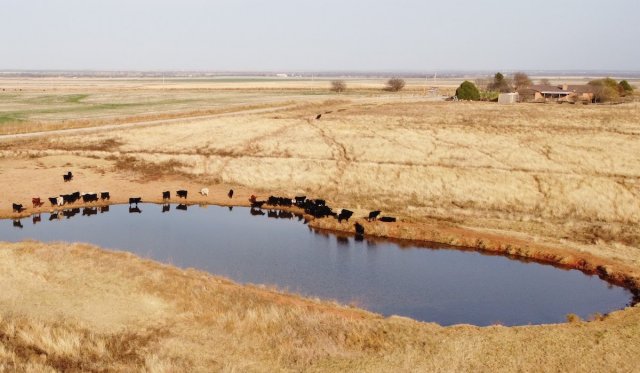
WASHINGTON — Oklahoma farmers expressed optimism about the Senate’s recent 51-49 vote to uphold the Trump administration’s Navigable Waters Protection Rule, which replaced an Obama-era regulation farmers feared would lead to costly litigation and limit water use on their own land.
“When [the Obama-era rule] first came out, it was panic time,” said Jimmy Kinder, a farmer from Walters.
Kinder’s farm is 11 miles from the Red River, the closest navigable water, but under the Obama-era ruling, Kinder was at risk of litigation if heavy rains caused runoff from his farm into the river.
This story was reported by Gaylord News, a Washington reporting project of the Gaylord College of Journalism and Mass Communication at the University of Oklahoma.
“The one thing I was worried about is that we run cattle, and if [manure] goes into the waterway, that could be a problem,” Kinder said. “It was just a cloud hung over us.”
Oklahoma Farm Bureau President Rodd Moesel was also pleased with the upholding of the Trump administration’s rule.
“We think the redefinition that was done under the Trump administration is much clearer and gives a lot more clarity to our farmers and ranchers, and for that matter, everyone else who owns land,” said Moesel.
The Senate vote occurred just a day after President Joe Biden’s nominee to lead the U.S. Environmental Protection Agency Michael Regan told a key senate committee he wanted to look at the options and any lingering concerns over the rule.
“But I also want to be sure that we do that in a way that we are protecting our water quality, our wetlands, and our bays,” said Regan, who currently heads North Carolina’s Department of Environmental Quality.
Under the NWPR, non-navigable wetlands, ponds, streams and rivers are less heavily regulated under the Clean Water Act, allowing farmers to manage and operate those waters without fear of costly litigation.
Prior to the Trump Administration’s rule taking effect in June of 2020, the Obama administration’s Waters of the United States (WOTUS) rule was opposed by farmers due to what they viewed as the rule’s obscurity and broadness. They feared WOTUS would limit their use of waters by leading to uncertainty over whether waters on their own land would fall under the Federal Clean Water Act.
“It’s like [they] can’t tell you for certain what the speed limit is, but [they’ll] let you know when you’re speeding,” Kinder said of the Obama-era WOTUS ruling.
He pointed to lawsuits filed across the country relating to which bodies of water were considered WOTUS, and which were of fair use for farmers.
“It’s been a patchwork of what rule applies where,” Moesel said.
The Trump rule has caused some blowback from environmental groups who believe the Trump-era definition of WOTUS could leave bodies of water vulnerable to pollution without regulation from the federal government.
Still, the rule enjoys wide support from Republican lawmakers.
U.S. Sen. Jim Inhofe (R-OK), a veteran member of the Senate Environment and Public Works Committee, voiced concern over the fate of the NWPR rule during Regan’s confirmation hearing last week.
“Can we have a chance to talk about [NWPR]?” Inhofe asked Regan. “That issue is going to be the one — and politically I have to say this too — it’s one that everyone ought to be concerned about because that’s the number one issue,” Inhofe added.
Regan sought to reassure Inhofe and other Republicans of his collaborative approach to government in his opening statement but was met with skepticism.
“In North Carolina, we’re moving beyond the old argument that we have to pit creating jobs against protecting the environment,” Regan said.
‘Plenty of room for how these things will be implemented’
If confirmed, Regan said he would work with the entire administration to power America’s economy with “cleaner energy and create millions of good-paying middle class jobs.”
Regan spoke to the uneasiness surrounding Biden’s recent executive orders and the progress that could be made.
“I see the executive orders as setting goals and setting the vision. But in those executive orders, they leave plenty of room for how these things will be implemented,” Regan said. “So we have a ton of time, in my opinion, to aim for these goals but massage the processes by which we would achieve those goals.”
Moesel said he is cautious but hopeful that Regan will keep farmers in mind.
“Making sure we have those lines of communication with [Regan] and the others in his agency is very important,” Moesel said. “But the early signs from based on what the North Carolina folks have told us from dealing with him are hopeful.”
Despite Regan’s claims of his collaborative approach toward government, Inhofe voted against his nomination to be the administrator of the EPA on Tuesday. The Environment and Public Works Committee voted 14-6 to move Regan’s nomination to the full Senate.
“While I have great respect for Secretary Regan, I cannot in good conscience vote to confirm him to lead the EPA as he will be tasked with carrying on many failed Obama-era policies,” Inhofe said in a press release.
Thursday’s 51-49 vote was tipped toward Republicans due to Sen. Joe Manchin (D-WV) joining them in favor of Trump’s NWPR rule.
In the future, Biden could negotiate with Manchin in hopes of splitting the vote 50-50, leaving Vice President Kamala Harris to cast the deciding vote.






















